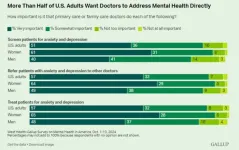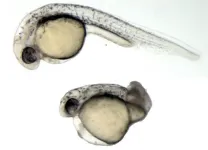(Press-News.org) Females sleep less, wake up more often and get less restorative sleep than males, according to a new animal study by CU Boulder researchers.
The findings, published in the journal Scientific Reports, shed new light on what may underlie sleep differences in men and women and could have broad implications for biomedical research, which for decades has focused primarily on males.
“In humans, men and women exhibit distinct sleep patterns, often attributed to lifestyle factors and caregiving roles,” said senior author Rachel Rowe, assistant professor of integrative physiology. “Our results suggest that biological factors may play a more substantial role in driving these sleep differences than previously recognized.”
Sleep research has exploded in recent years, with thousands of animal studies exploring how insufficient sleep impacts risk of diseases like diabetes, obesity, Alzheimer’s and immune disorders—and how such diseases impact sleep. Meanwhile, mice have often been the first to be tested to see whether new drugs, including medications for sleep, work and what the side effects are.
But many of those results may have been skewed due to a lack of female representation, the study suggests.
“Essentially, we found that the most commonly used mouse strain in biomedical research has sex-specific sleep behavior and that a failure to properly account for these sex differences can easily lead to flawed interpretations of data,” said first author Grant Mannino, who graduated with degrees in psychology and neuroscience and was named outstanding undergraduate of the College of Arts and Sciences in May.
How mice sleep
For the non-invasive study, the authors used specialized cages lined with ultrasensitive movement sensors to assess the sleep patterns of 267 “C57BL/6J” mice.
Males slept about 670 minutes total per 24-hour period, about an hour more than female mice. That extra sleep was non-Rapid Eye Movement (NREM) sleep—the restorative sleep when the body works to repair itself.
Mice are nocturnal and are “polyphasic sleepers”—napping for a few minutes before arousing briefly to survey their environment and then resuming their slumber. Females, the study found, have even shorter bouts of sleep—essentially, their sleep is more fragmented.
Similar sex differences have been seen in other animals, including fruit flies, rats, zebrafish and birds. Evolutionarily, it makes sense.
“From a biological standpoint, it could be that females are designed to be more sensitive to their environment and be aroused when they need to be because they are typically the one who is caring for the young,” Rowe said. “If we slept as hard as males sleep, we would not move forward as a species, right?”
Stress hormones like cortisol (which promotes wakefulness) and sex hormones likely play a role. For instance, women tend to report worse sleep during the time in their menstrual cycle when estrogen and progesterone are at their lowest.
Some have hypothesized that females inherently require less sleep.
“For me, the question is: Are we creating too much stress for ourselves because we don’t sleep as much as our husband or partner and think our sleep is poor when actually that is a normal sleep profile for ourselves?” said Rowe.
The authors hope their findings inspire more research into underlying biological differences. More importantly, they hope the study prompts scientists to re-evaluate how they do research.
Progress made but more work to be done
In 2016, the National Institutes of Health began requiring scientists applying for funding for animal studies to consider “sex as a biological variable.” Progress has been made, but research has shown that sex bias still exists. And it can have real consequences, the authors found.
When they simulated a sleep treatment that worked best in females, they found that it was accurately reflected only if the sample size was made up evenly of males and females.
Bottom line: If females are underrepresented, drugs that work best for them may seem ineffective, or side effects that hit hardest may go unnoticed.
“The pipeline from bench to bedside is decades-long and often things that work in animals fail when they get to clinical trials. Is it taking so long because sex isn’t being considered enough?” said Rowe.
The authors encourage researchers to include both sexes equally when possible, analyze data for males and females separately, and re-evaluate past studies that underrepresented females.
“The most surprising finding here isn’t that male and female mice sleep differently. It’s that no one has thoroughly shown this until now,” said Rowe. “We should have known this long before 2024.”
END
Females sleep less, awaken more frequently than males
A new study in mice shows that males and females have profoundly different sleep patterns
2024-11-21
ELSE PRESS RELEASES FROM THIS DATE:
Most Americans want primary care providers to address mental health
2024-11-21
WASHINGTON, D.C. — Nov. 21, 2024 — A majority of Americans (70%) say they would prefer to be asked about both their physical and mental health during medical appointments with their primary care providers (PCPs). The finding from the new West Health-Gallup Survey on Mental Health in America comes as more than one in five U.S. adults, or 59.3 million people, were living with a mental illness in 2022, and little more than half of them (50.6%) received treatment within the prior year.
According to the survey, majorities of men (65%) and women (76%) are eager to discuss both their mental and physical health with their primary ...
Millions of Americans hurt by others’ drinking, drug use: study
2024-11-21
by Amy Norton
PISCATAWAY, NJ – The risks of alcohol and other drug consumption to the user are well known, but many Americans--nearly 160 million--say they’ve been harmed by someone else’s substance use, according to a new study in the Journal of Studies on Alcohol and Drugs.
In a national survey of U.S. adults, researchers found that 34% said they’d ever suffered “secondhand harm” from someone else’s alcohol use--ranging from marriage and family problems to financial fall-out to being assaulted or injured in a drunk-driving accident. Meanwhile, 14% said they’d been harmed ...
Plasma-derived atomic hydrogen advances low-temperature CO2 methanation at high yield
2024-11-21
Plasma-derived atomic hydrogen (PDAH) enables low-temperature carbon dioxide methanation reaction through the Eley−Rideal-type reaction channel, improving methane yield at low temperatures, as shown by scientists at Science Tokyo. The findings underscore the potential of PDAH in advancing sustainable carbon dioxide recycling methods and optimizing other catalytic hydrogenation reactions, providing a promising avenue for improved efficiency in various energy and environmental technologies.
Despite declining reserves and significant carbon dioxide (CO2) emissions contributing to ...
Photon qubits challenge AI, enabling more accurate quantum computing without error-correction techniques
2024-11-21
The just-announced Nobel Prize in Chemistry was awarded to University of Washington Professor David Baker, Google DeepMind CEO Hershavis, and Principal Investigator John Jumper for their work using AI to predict the structure of proteins, enabling the discovery of new drugs and new materials. In an era where AI and data are driving the scientific revolution, quantum computing technology is emerging as another game-changer in the development of new drugs and new materials.
Dr. Hyang-Tag Lim's ...
Single gene causes embryo notochord deformity in zebrafish
2024-11-21
Can a single protein-encoding gene determine whether a vertebrate embryo develops normally? Yes, according to Osaka Metropolitan University researchers, who found that suppression of Pcdh8 is essential for the notochord to elongate properly in zebrafish.
Graduate School of Medicine Dr. Masatake Kai and Professor Makoto Kondo focused on this paraxial protocadherin (PAPC), which is excluded when dividing cells migrate and form the notochord in the embryo.
In the experiments with zebrafish embryo, when this PAPC is not ...
Sylvester Cancer Tip Sheet - Nov 2024
2024-11-21
NOVEMBER TIP SHEET - SYLVESTER COMPREHENSIVE CANCER CENTER
CANCER RESEARCH
Sylvester Researchers to Share Insights at ASH 2024 Annual Meeting
Dozens of physician-scientists and other investigators from Sylvester Cancer will share their insights at ASH 2024, the American Society of Hematology’s 66th-annual meeting in San Diego, Dec. 7-10. Sylvester researchers will be involved in more than 130 presentations, including oral, poster and special sessions. Additionally, Sylvester Director Stephen D. Nimer, MD, will receive the 2024 ASH Mentor Award for his exemplary work in mentoring trainees and colleagues.
BREAST CANCER
The Cancer Journey: Asking For and Accepting Help
Journalist ...
AI speaks volumes when it comes to detecting Parkinson’s disease
2024-11-21
Algorithms that can detect subtle changes in a person’s voice are emerging as a potential new diagnostic tool for Parkinson’s disease, according to researchers from Iraq and Australia.
Speech impairments are often the first indicators of the fastest-growing neurological disease in the world, affecting more than 8.5 million people, but traditional diagnostic methods are often complex and slow, delaying early detection.
Researchers from Middle Technical University (MTU) in Baghdad and the University of South Australia (UniSA) have recently published a conference paper reviewing ...
Signals of inflammation during pregnancy linked to aging and memory changes 50 years later
2024-11-21
Findings from a Mass General Brigham-led study that has followed participants since before birth may offer clues about the origins of Alzheimer’s disease.
KEY TAKEAWAYS
Stress-related immune activity during the late second to early third trimester of pregnancy can have long-term sex-dependent effects on offspring memory circuitry, function, and decline that potentially increase vulnerability for memory disorders, such as Alzheimer’s disease, after menopause.
Sex differences in immune function begin in fetal development ...
Two million ex-smokers currently vape in England
2024-11-21
About one in five people who have stopped smoking for more than a year in England currently vape, equivalent to 2.2 million people, according to a new study led by UCL (University College London) researchers.
The study, published in the journal BMC Medicine and funded by Cancer Research UK, found that this increased prevalence was largely driven by greater use of e-cigarettes in attempts to quit smoking.
However, the researchers also found a rise in vaping uptake among people who had already stopped smoking, with an estimated one in 10 ex-smokers who vape having quit smoking prior to 2011, when e-cigarettes ...
When trees 'talk:' Researchers probe ancient wood for clues about massive solar storms
2024-11-21
The Northern Lights were visible much farther south than usual this year, and pictures of the colorful hues filled social media. Now, imagine an aurora hundreds of times brighter – except no one would be able to snap a photo of it, as the onslaught of particles rushing in from the sun would instantly turn smartphones into bricks.
Such extreme solar storms are rare – only six are known to have left their traces on Earth in the past 14,500 years, and none have been witnessed since the height of the Assyrian Empire nearly 2,700 years ago. A research team ...
LAST 30 PRESS RELEASES:
COVID-19 vaccination during pregnancy may help prevent preeclampsia
Menopausal hormone therapy not linked to increased risk of death
Chronic shortage of family doctors in England, reveals BMJ analysis
Booster jabs reduce the risks of COVID-19 deaths, study finds
Screening increases survival rate for stage IV breast cancer by 60%
ACC announces inaugural fellow for the Thad and Gerry Waites Rural Cardiovascular Research Fellowship
University of Oklahoma researchers develop durable hybrid materials for faster radiation detection
Medicaid disenrollment spikes at age 19, study finds
Turning agricultural waste into advanced materials: Review highlights how torrefaction could power a sustainable carbon future
New study warns emerging pollutants in livestock and aquaculture waste may threaten ecosystems and public health
Integrated rice–aquatic farming systems may hold the key to smarter nitrogen use and lower agricultural emissions
Hope for global banana farming in genetic discovery
Mirror image pheromones help beetles swipe right
Prenatal lead exposure related to worse cognitive function in adults
Research alert: Understanding substance use across the full spectrum of sexual identity
Pekingese, Shih Tzu and Staffordshire Bull Terrier among twelve dog breeds at risk of serious breathing condition
Selected dog breeds with most breathing trouble identified in new study
Interplay of class and gender may influence social judgments differently between cultures
Pollen counts can be predicted by machine learning models using meteorological data with more than 80% accuracy even a week ahead, for both grass and birch tree pollen, which could be key in effective
Rewriting our understanding of early hominin dispersal to Eurasia
Rising simultaneous wildfire risk compromises international firefighting efforts
Honey bee "dance floors" can be accurately located with a new method, mapping where in the hive forager bees perform waggle dances to signal the location of pollen and nectar for their nestmates
Exercise and nutritional drinks can reduce the need for care in dementia
Michelson Medical Research Foundation awards $750,000 to rising immunology leaders
SfN announces Early Career Policy Ambassadors Class of 2026
Spiritual practices strongly associated with reduced risk for hazardous alcohol and drug use
Novel vaccine protects against C. diff disease and recurrence
An “electrical” circadian clock balances growth between shoots and roots
Largest study of rare skin cancer in Mexican patients shows its more complex than previously thought
Colonists dredged away Sydney’s natural oyster reefs. Now science knows how best to restore them.
[Press-News.org] Females sleep less, awaken more frequently than malesA new study in mice shows that males and females have profoundly different sleep patterns





